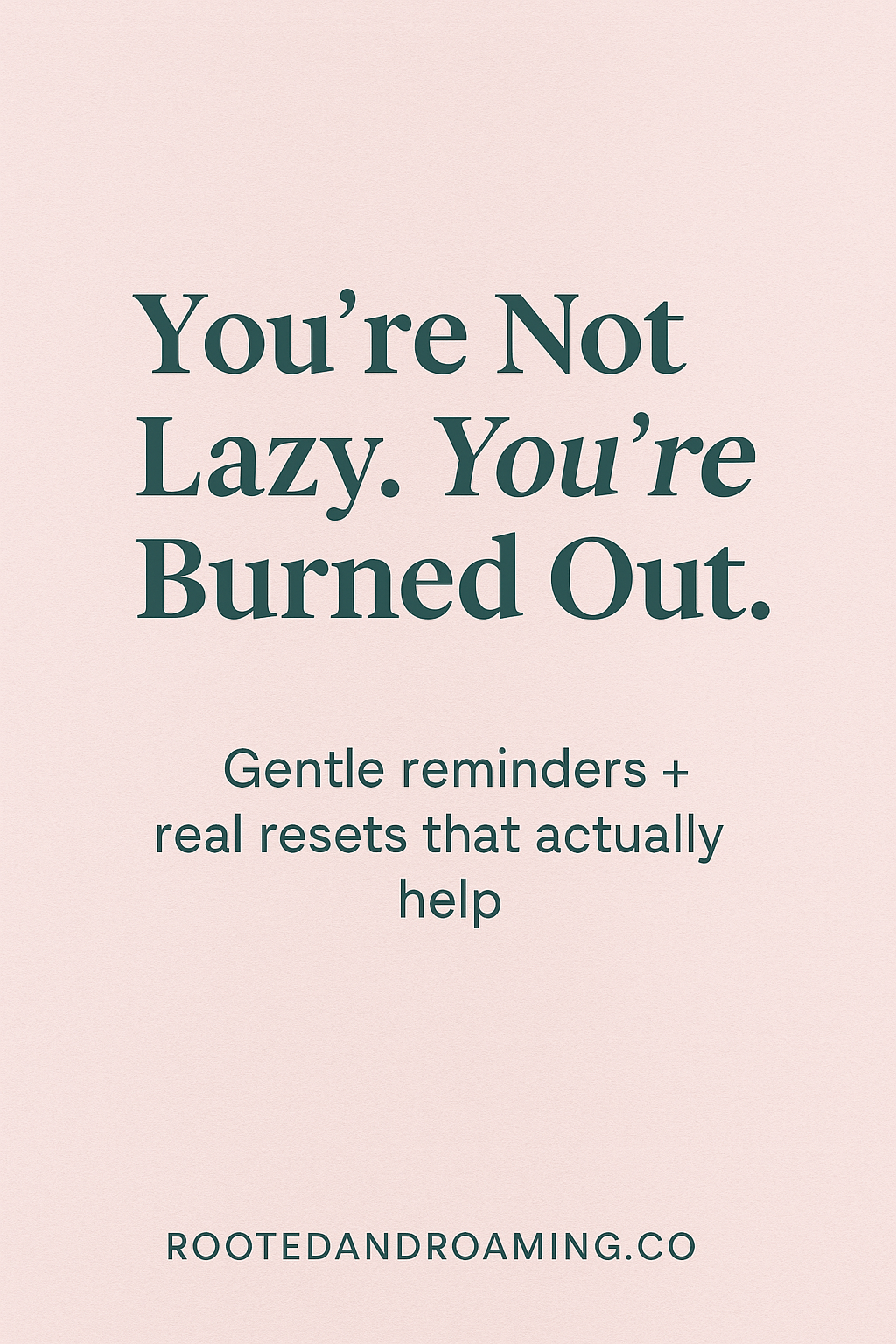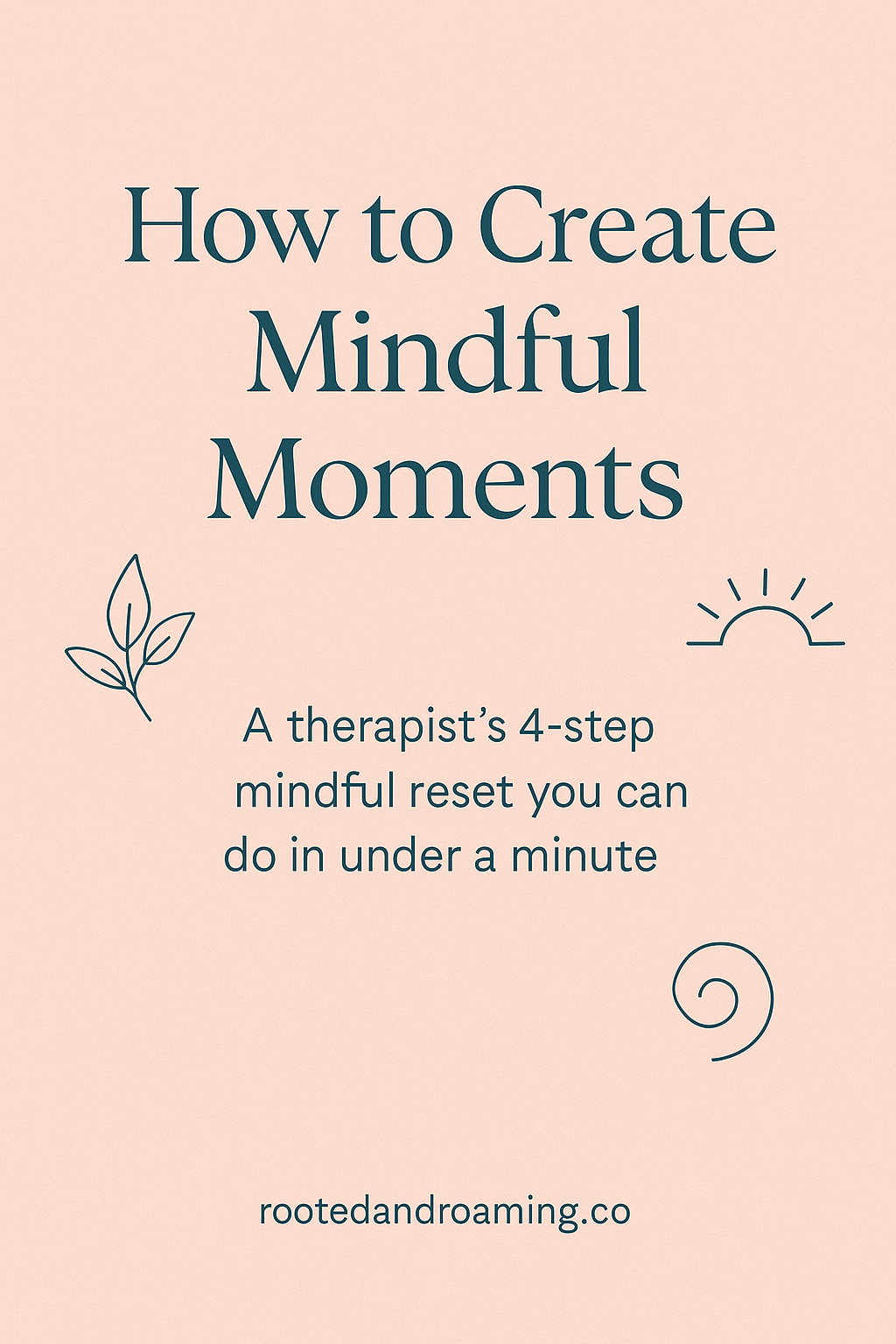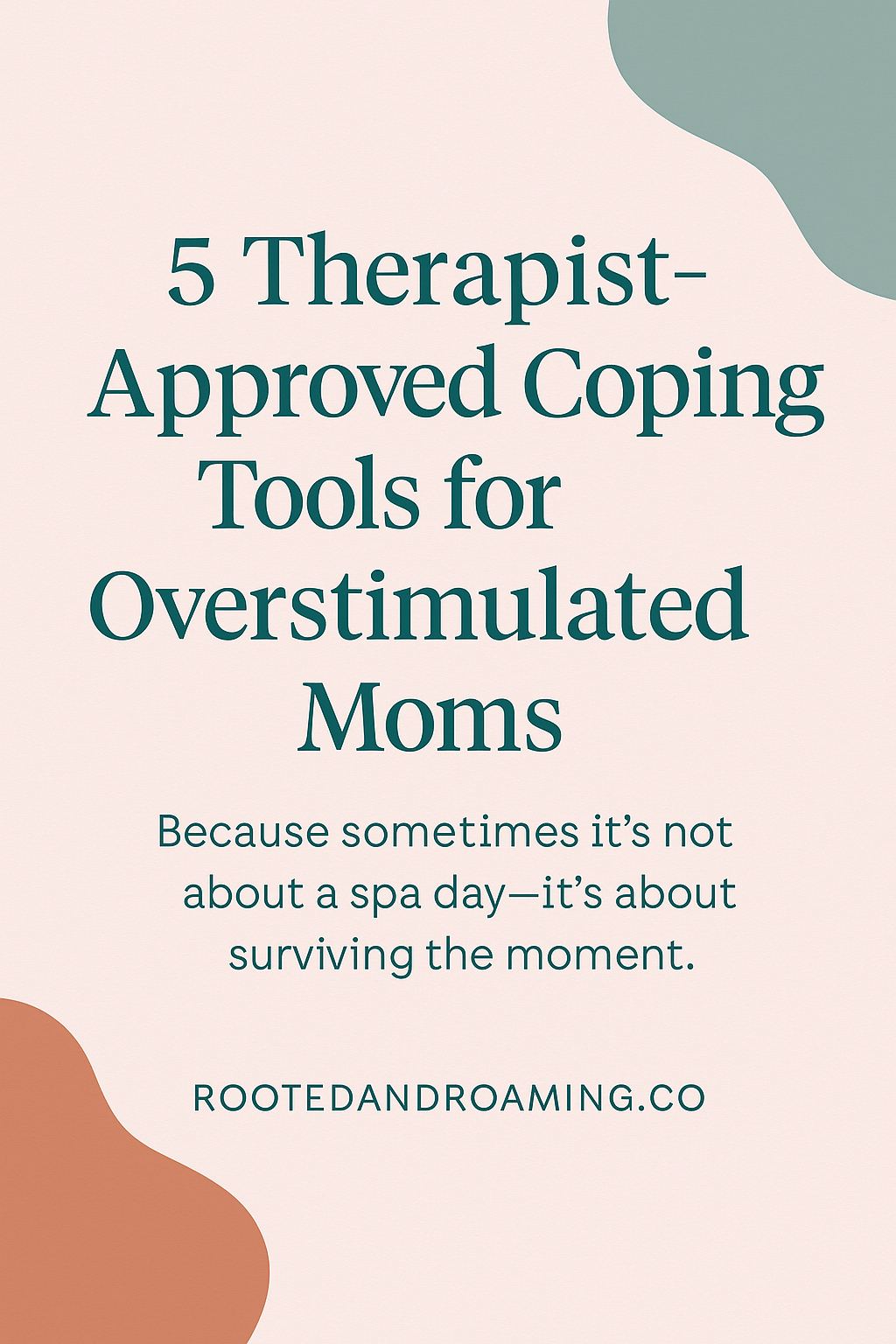You’re Not Lazy. You’re Burned Out.
Feeling unmotivated or on edge? You’re not lazy—you’re likely burned out. A licensed therapist shares signs, resets, and what actually helps.
Because sometimes the heaviest thing you carry is the expectation to “bounce back.”
Let’s clear something up:
If you’ve been feeling unmotivated, foggy, or just meh, you’re not broken. You’re probably not lazy.
You’re likely burned out — and your body is begging for something softer than another productivity hack.
As a licensed mental health counselor (and a new mom), I’ve seen how easy it is to mislabel burnout as a personal failure.
We say things like:
“I should have more energy by now.”
“Why can’t I just get it together?”
“Other people do way more — what’s wrong with me?”
But here's the truth: Burnout isn’t a lack of discipline. It’s a signal.
Your nervous system is waving a white flag.
And you don’t need to “push through it.” You need to come back to yourself.
What Burnout Actually Looks Like:
Not all burnout is loud. Sometimes it’s:
The brain fog that makes basic tasks feel impossible
Avoiding messages or emails because they feel too overwhelming
Feeling tired even after a full night of sleep
Not enjoying things you used to love
Snapping at people you care about
Feeling constantly on edge or overstimulated
That “ugh” feeling when even rest doesn’t feel restful
Sound familiar?
What Helps (That Doesn’t Feel Like Just Another To-Do List)
Lower the bar
Seriously. If your energy is at a 3/10, then showing up at 3/10 is a win.
You’re still showing up.Give your nervous system a soft landing
Try one gentle reset to shift the overwhelm:
Step outside and let the sunlight hit your face
Stretch for one minute (or do a 60 second plank if you’re feeling fiery)
Put your feet in the grass
Listen to a calming song on repeat
Do nothing for 60 seconds (yes, literally nothing)
3. Name it to tame it
Try this:
“I’m not lazy. I’m overwhelmed and overextended. My body is asking me to slow down.”
That’s not weakness. That’s wisdom.
4. Stop earning rest
You don’t have to finish your list to deserve a break.
You don’t have to clean the kitchen to be allowed to lie down.
Rest is not a reward. It’s a basic need, Take the PTO without feeling guilty.
A final reminder, from someone who’s walked both sides of this:
The version of you that feels “off” or “behind” right now?
She’s not failing.
She’s adjusting. Healing. Recalibrating.
And that’s brave work.
Save or Share This Post If:
You’ve been judging yourself for needing a slower pace
You’ve called yourself lazy lately
You’re in a season of survival, not productivity
You’re not alone. And you’re not lazy.
Let that sink in.
📌 Love this post? Save it for later on Pinterest!
You Might Also Like:
✨ Glimmers: The Tiny Moments That Helped Me Heal
From baby giggles to sunlight through the trees—these tiny moments of peace reminded me I was safe and okay.
🌪 Coping Tools for Overstimulated Moms
When the world gets too loud (or too sticky), try these therapist-approved grounding tools.
⏱ You Can Do Anything for One Minute
A go-to mantra for when mindfulness feels out of reach. Because one minute really can reset your day.
Glimmers: How Tiny Moments Calm Your Nervous System and Boost Healing
Discover the power of glimmers—tiny, everyday moments that calm your nervous system and remind you it’s safe to exhale. Learn how to spot glimmers and why they matter for healing.
Because healing doesn’t always look like a breakthrough—it’s often in the little things.
Lately, I’ve been paying more attention to glimmers.
You know, those small, fleeting moments that remind your nervous system it’s safe to exhale.
The opposite of triggers, glimmers are the subtle signs that something is good, comforting, or just right—even if only for a second.
Maybe it’s:
✨ The sound of your baby’s laugh
✨ The way sunlight hits your kitchen table during naptime
✨ A favorite song coming on when you're feeling overwhelmed
✨ Finally drinking your coffee while it's still hot
In therapy speak, glimmers are cues of safety—little signals that activate the parasympathetic nervous system, helping us feel grounded, connected, and calm.
In everyday life, they’re those tiny moments that catch you by surprise and whisper:
"I’m okay. This is okay."
As a therapist and a mom, I’ve learned that finding these glimmers isn’t just helpful—it’s essential.
Especially in the chaos of early motherhood—or the pressure of balancing a million things—it’s easy to get swept into survival mode.
Glimmers help pull us back.
They’re the micro-moments of nervous system regulation we don’t always realize we need.
And the beautiful part?
You don’t have to chase them.
Glimmers are already around you.
The trick is learning to notice them—to train your brain, little by little, to spot what feels good.
A Few of My Recent Glimmers
A deep breath while baby naps on my chest
Catching a sunset through the rearview mirror
A stranger offering a knowing smile as I bounced through Target with my baby strapped to me like a tiny koala
That first exhale in child’s pose after a long day
My dog curling up next to me just when I needed a little comfort
The baby and dog napping side by side—pure peace in one blurry moment
Locking eyes with my husband across the room when the baby does something feral, like a mini telepathic “Welp”
Hearing “you’re doing a good job” when I didn’t even ask
Rooted Takeaway
Start small.
Take just one minute a day to notice a glimmer—something that made you feel warm, calm, or connected. Write it down if you can.
The more you practice noticing them, the easier it becomes.
And soon, even on hard days, you’ll find your nervous system reaching for peace instead of panic.
📌 Save this post for the days you need a reminder to look for the light.
You Might Also Like:
⏱ You Can Do Anything for One Minute
A simple mental reset I leaned on during postpartum, workouts, and stress—because one minute really can change everything.
🌪 Coping Tools for Overstimulated Moms
Overwhelmed by noise, clutter, or chaos? These quick, grounding tools were made for you.
🕯 How to Create Mindful Moments (Even When Life Feels Loud)
You don’t need a retreat—you just need five quiet seconds and a little intention. Here’s how I make mindfulness fit real life.
How to Create Mindful Moments (Even When Life Feels Loud)
Learn 4 quick mindfulness techniques you can do anywhere—even in the chaos of mom life. Therapist-approved, under 1 minute, and totally doable.
You don’t need a 30-minute meditation or a silent retreat to practice mindfulness.
As a therapist—and a mom—I believe mindfulness lives in the in-between moments.
The stroller walks. The nap time quiet. The pause between loading the dishwasher and switching the laundry.
That’s where presence happens.
And the best part? You can tap into it anytime—with this 4-step mindful reset that takes less than a minute.
1. Breathe in the View
Notice something right in front of you—
light filtering through a window
the trees swaying outside
the way your baby’s chest rises and falls while sleeping
Let your inhale gently anchor you in the present moment.
2. Exhale the Noise
With each exhale, let go of what’s swirling in your head.
You don’t need to solve anything. Just breathe it out.
That is enough.
3. Let Your Shoulders Drop
Notice where you’re holding tension—your jaw, shoulders, hands.
Then soften. Even a 10% release is still a release.
That shift? It’s a reset in disguise.
4. Feel the Lightness
Pause.
Does anything feel slightly easier?
Maybe your breath is slower. Your body softer. Your thoughts quieter.
That’s mindfulness in motion.
Rooted Takeaway
Mindfulness isn’t about being perfect.
It’s about noticing.
Noticing your body. Your breath. What you’re holding.
And giving yourself permission to come back to yourself—
one breath at a time.
📌 Want to save this mindful reset for later?
Tap to pin it and come back to it anytime you need a moment of calm.
Want more moments like this?
Join my newsletter for simple, therapist-approved tools for everyday mindfulness, mom life, and mental wellness—no overwhelm required.
You Might Also Like:
✨ Glimmers: The Tiny Moments That Helped Me Heal
From baby giggles to sunlight through the trees—these tiny moments of peace reminded me I was safe and okay.
🌪 Coping Tools for Overstimulated Moms
When the world gets too loud (or too sticky), try these therapist-approved grounding tools.
⏱ You Can Do Anything for One Minute
A go-to mantra for when mindfulness feels out of reach. Because one minute really can reset your day.
5 Therapist-Approved Coping Tools for Overstimulated Moms
Five therapist-approved coping tools for overstimulated moms. Learn quick strategies like box breathing, mindfulness, and "done lists" for mental reset.
Because sometimes it’s not about a spa day—it’s about surviving the moment.
I remember standing in the kitchen—baby crying, phone ringing, dogs barking—and wondering how I was supposed to hold it all together.
The noise, the touch, the never-ending demands—it was just too much.
As a licensed mental health counselor and a new mom, I’ve seen both sides:
The clinical tools that actually work
And the real-life chaos where they have to fit
Here’s the truth: you don’t need a full reset to feel better. You need small, doable tools that fit inside your real life.
So if you're feeling overstimulated, touched out, or just barely hanging on—these 5 therapist-approved strategies are for you.
1. Box Breathing: A Calm Reset for a Frazzled Brain
This simple technique is used by everyone from therapists to Navy SEALs. It’s a quick way to calm your nervous system and bring your brain out of the chaos.
How to do it:
Inhale for 4 seconds
Hold your breath for 4 seconds
Exhale for 4 seconds
Hold again for 4 seconds
Repeat 3–4 rounds.
🕓 Use it when: you're overwhelmed by noise, touch, or decision fatigue and need a moment to center yourself—even in the middle of the mess.
2. Micro-Moments of Mindfulness
No, you don’t need a 30-minute meditation app. Mindfulness can happen in 30 seconds.
Try this:
Savor the first sip of coffee
Watch your baby’s chest rise and fall
Feel the warm water hit your skin in the shower
These small pauses help ground your nervous system and remind your brain that you're safe—even if your toddler is mid-tantrum.
3. Name It to Tame It
This one's backed by neuroscience: when you name your emotion, your brain begins to regulate it.
Next time you’re maxed out, say (or write):
“I feel touched out.”
“I feel overstimulated.”
“I feel mentally crowded.”
Labeling the feeling helps your brain process it—instead of spinning in it.
4. Try a "Done List" Instead of a To-Do List
Some days, the to-do list feels like a personal attack. So flip it.
At the end of the day, list what you did do—no matter how small.
Examples:
“Fed the baby 8 times”
“Replied to 2 emails”
“Didn’t scream when the dog barked during nap time”
This simple shift moves you from guilt to gratitude—and reminds you that you're showing up big time.
5. Get Outside—Even for 5 Minutes
Nature is regulation.
A few minutes outside can lower cortisol levels, clear your mind, and reset your senses.
Breathe the air. Let the sun hit your face. Touch the grass. Even if your baby’s on your hip and your coffee’s cold, it still counts.
Rooted Takeaway
Motherhood is beautiful—and so overstimulating.
Some days you’re floating.
Other days you’re drowning in noise, needs, and notifications.
These small coping tools? They’re your life rafts.
You don’t have to fix everything. You just need to give yourself care—one tiny moment at a time.
Which tool will you try first?
Tag a mama who’s feeling maxed out.
💬 You’re not alone—and you’re doing better than you think.
Pin this for the next time you’re touched out, maxed out, and hanging on by a sip of cold coffee.
You Might Also Like:
⏱ You Can Do Anything for One Minute
This tiny mindset shift helped me survive overstimulation, stress, and motherhood chaos—one breath at a time.
✨ Glimmers: The Tiny Moments That Helped Me Heal
From fresh air to eye contact—these are the nervous system green flags that helped me reset and reconnect.
🕯 How to Create Mindful Moments (Even When Life Feels Loud)
You don’t need total silence—just a little intention. Here’s how I create micro-moments of calm in real life.
The One-Minute Mantra That Gets Me Through Everything
A simple 60-second mantra helped me survive tough workouts, postpartum life, and everyday stress. Here’s how “You can do anything for 1 minute” became my go-to mental health reset.
How “You can do anything for 1 minute” became my go-to tool for movement, motherhood, and mental health
Somewhere between the final set of dumbbell squats and the 3 a.m. feeding, I whisper it to myself:
You can do anything for 1 minute.
It’s become a quiet mantra in my life—a phrase that shows up when my body is shaking in a Pilates hold, when I’m overwhelmed at work, or when I’m rocking my baby back to sleep for the fourth time in one night.
And the wildest part? It actually works.
This tiny piece of self-talk has helped me push through discomfort, reset in moments of chaos, and stay grounded when everything feels like too much.
Where This Mantra Shows Up in My Life
In Workouts
When my muscles burn and I want to drop the weights or collapse out of a plank—especially when my Pilates instructor is clearly trying to kill me with a 15-minute core series—I remind myself: Just one more minute. That’s all I need to stay present and push through.
During Labor
With each contraction, I focused only on that moment. I didn’t need to survive the whole labor—just the next 60 seconds. It gave me a sense of control in a situation that felt completely out of my hands.
In Motherhood
Crying fits. Nap battles. Overstimulation. I can’t always fix the moment, but I can breathe through it for 60 seconds. And honestly? Sometimes that’s all it takes to shift the energy—for both of us.
In Everyday Stress
Tough meetings. Endless to-do lists. Unexpected overwhelm. Taking just one intentional minute helps me respond instead of react.
Why It Works (And It’s Not Just Fluff)
This mantra isn’t just a feel-good phrase—it’s a real grounding tool rooted in mental health strategies.
It brings you into the present
You don’t have to solve the whole day. You just have to get through this minute.
It breaks the “I can’t” loop
Instead of shutting down, you open up a tiny window of possibility. Just one more breath. Just one more moment.
It builds nervous system resilience
Holding steady during short bursts of stress (physical or emotional) trains your brain: I can do hard things… and still be okay.
1-Minute Resets You Can Try Today
New to this mindset? Start with one of these simple, powerful shifts:
Box breathing: Inhale 4 – Hold 4 – Exhale 4 – Hold 4
Step outside: Feel the sun or fresh air on your skin
Do a 60-second stretch or plank
Repeat a grounding mantra: “I’m doing enough. I am enough.”
Put on your favorite feel-good song
Drink a full glass of water like it’s a reset button
Final Thoughts
This mantra has carried me through some of the most intense moments of my life—not because it magically made things easier, but because it reminded me that I could keep going.
One minute at a time. One breath at a time.
You can do anything for 1 minute.
And sometimes, that’s all you need.
Save this for when the day feels like too much—and you need a reminder that you can do hard things (for just one minute).
You Might Also Like:
🌪️ Coping Tools for Overstimulated Moms
Feeling one request away from snapping? These grounding tools were made for those loud, sticky, overstimulating days.
✨ Glimmers: The Tiny Moments That Helped Me Heal
Sometimes healing shows up in the smallest ways. Here’s how I started noticing the nervous system green flags hiding in plain sight.
🕯 How to Create Mindful Moments (Even When Life Feels Loud)
Mindfulness doesn’t have to be fancy or quiet. Here's how I build calm into real-life chaos—with a baby on my hip.







